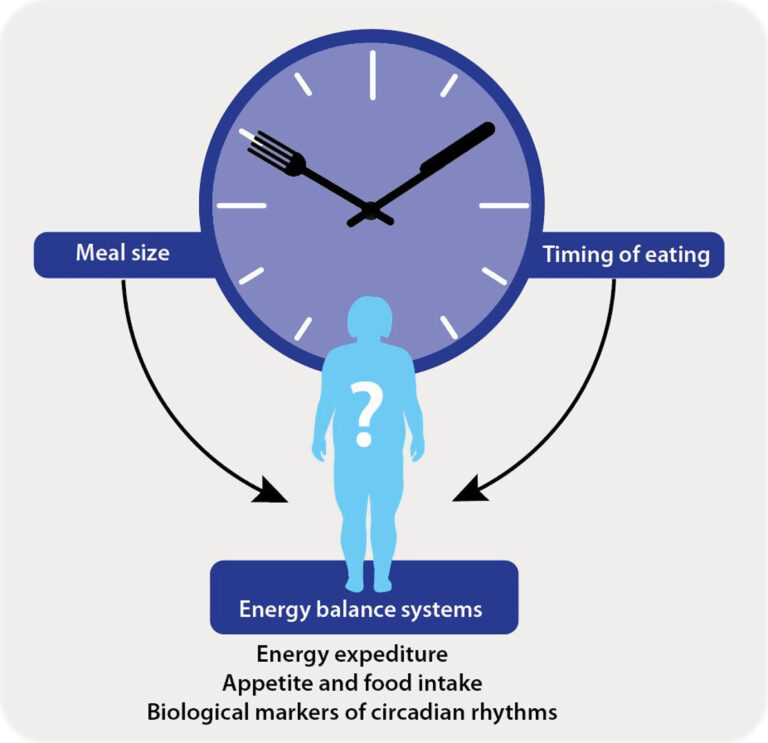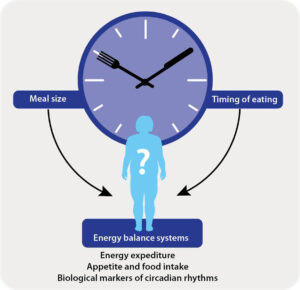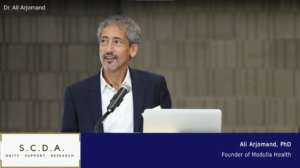Have you ever heard the saying “Eat breakfast like a king, lunch like a prince, and dinner like a pauper”? It turns out there might be some scientific truth to this age-old adage. Welcome to the fascinating world of chrono-nutrition, where the timing of your meals could be just as important as what you eat.
The Circadian Rhythm: Your Body’s Internal Clock
Our bodies operate on a 24-hour cycle known as the circadian rhythm. This internal clock doesn’t just control when we feel sleepy or alert; it also influences numerous physiological processes, including metabolism and digestion.
Recent studies have shown that our bodies process food differently depending on the time of day. For instance, our insulin sensitivity and ability to metabolize glucose tend to be higher in the morning. This suggests that calories consumed earlier in the day might be used more efficiently by our bodies.
The Big Breakfast Hypothesis
The Big Breakfast Study, funded by the Medical Research Council in the UK, is set to explore how meal timing affects our body’s energy use and weight management. This groundbreaking research delves into the intricate relationship between our biological clocks and metabolism, potentially revolutionizing our approach to diet and health.
Specifically, the study aims to test whether consuming a larger proportion of our daily calories at breakfast could lead to more effective weight loss compared to eating most of our calories later in the day. This isn’t just about total calorie intake; it’s about when those calories are consumed.
Previous research has hinted at the potential benefits of front-loading calories. One study found that participants who ate a big breakfast lost more weight than those who ate a big dinner, even when total daily calorie intake was the same. The Big Breakfast Study seeks to understand why this happens and how we can use this knowledge to improve weight management strategies.
The Science Behind Meal Timing
So, why might eating more in the morning be beneficial? It all comes down to our body’s natural rhythms. In the morning, our metabolism is typically more active, and our bodies are primed to use the energy from food more efficiently.
Additionally, eating a substantial breakfast might help regulate appetite throughout the day, potentially reducing overall calorie intake. Some studies suggest that a big breakfast could lead to lower levels of ghrelin, the “hunger hormone,” later in the day.
The Big Breakfast Study: A Closer Look
The Big Breakfast Study isn’t just about observing weight loss. The researchers are diving deep into the mechanisms behind energy metabolism. They’re looking at factors like the thermic effect of food (the energy expended in digesting and processing food), resting metabolic rate, and even how quickly food moves through our digestive system at different times of day.
One fascinating aspect of the study involves participants following different meal timing patterns. Some will eat most of their calories at breakfast, while others will have their largest meal in the evening. By comparing these groups, researchers hope to uncover how meal timing affects weight loss, energy levels, and overall health.
Beyond Weight Loss: Other Potential Benefits
While weight management is a primary focus, the implications of this research extend far beyond the scale. Understanding how meal timing affects our metabolism could have profound impacts on managing conditions like diabetes and cardiovascular disease.
For instance, some studies have suggested that eating earlier in the day might lead to better blood sugar control and improved insulin sensitivity. This could be particularly relevant for people with or at risk of developing type 2 diabetes.
Chrono-nutrition and Modern Lifestyles
In our fast-paced world, many of us have shifted towards eating later in the day. Late-night dinners and midnight snacks have become commonplace. However, this trend might be at odds with our body’s natural rhythms.
The Big Breakfast Study could provide valuable insights into how we can align our eating patterns with our internal clocks for optimal health. This doesn’t necessarily mean everyone needs to start eating huge breakfasts, but it might encourage us to rethink when we consume most of our calories.
Practical Implications: What This Could Mean for You
If the Big Breakfast Study confirms the benefits of front-loading calories, it could lead to new dietary guidelines. We might see recommendations not just about what to eat, but when to eat it. This could be particularly relevant for people struggling with weight management or metabolic issues.
However, it’s important to remember that nutrition is complex and highly individual. While eating more in the morning might be beneficial for many, it may not be the best approach for everyone. Factors like work schedules, personal preferences, and individual metabolic differences all play a role.
The Challenges of Chrono-nutrition Research
Studying the effects of meal timing is no easy feat. Our daily routines, sleep patterns, and even exposure to light can all influence our internal clocks. The Big Breakfast Study aims to control for these variables to isolate the effects of meal timing.
One particularly interesting aspect of the study involves a “phase shift” protocol. This will help researchers distinguish between the effects of our internal body clocks and the external cues we receive from our environment. It’s a complex approach, but it could provide valuable insights into how our bodies truly respond to meal timing.
Looking to the Future: Personalized Nutrition Plans
As we learn more about chrono-nutrition, we may move towards more personalized dietary advice. In the future, your ideal meal schedule might be based not just on your nutritional needs, but also on your individual circadian rhythm.
Imagine a world where your smartwatch doesn’t just track your steps, but also suggests the optimal times for you to eat based on your unique metabolic patterns. While we’re not there yet, studies like the Big Breakfast Study are paving the way for this kind of personalized approach to nutrition.
The Takeaway: Time Matters in Nutrition
While we await the results of the Big Breakfast Study, there are already some takeaways we can consider. If you’ve been struggling with weight management, it might be worth paying attention not just to what you eat, but when you eat it.
Consider front-loading your calories earlier in the day and see how it affects your energy levels and hunger. Remember, this doesn’t mean you have to force yourself to eat a huge breakfast if you’re not hungry. It’s about finding a rhythm that works for you and aligns with your body’s natural cycles.
Conclusion: A New Frontier in Nutrition Science
The Big Breakfast Study represents an exciting new frontier in nutrition science. By exploring the intricate dance between our biological clocks and our metabolism, it could reshape our understanding of diet and health.
As we await the results of this groundbreaking research, one thing is clear: when it comes to nutrition, timing matters. So the next time you sit down for a meal, consider not just what’s on your plate, but also what time it is. Your body’s internal clock might just be ticking along in approval.
References















